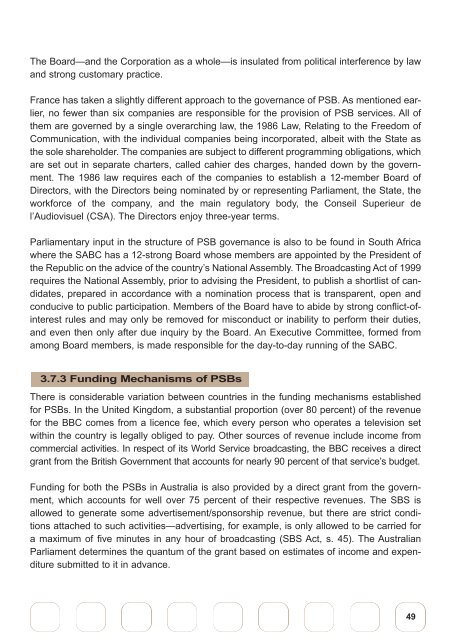Public service broadcasting: a best practices ... - unesdoc - Unesco
Public service broadcasting: a best practices ... - unesdoc - Unesco
Public service broadcasting: a best practices ... - unesdoc - Unesco
You also want an ePaper? Increase the reach of your titles
YUMPU automatically turns print PDFs into web optimized ePapers that Google loves.
The Board—and the Corporation as a whole—is insulated from political interference by law<br />
and strong customary practice.<br />
France has taken a slightly different approach to the governance of PSB. As mentioned earlier,<br />
no fewer than six companies are responsible for the provision of PSB <strong>service</strong>s. All of<br />
them are governed by a single overarching law, the 1986 Law, Relating to the Freedom of<br />
Communication, with the individual companies being incorporated, albeit with the State as<br />
the sole shareholder. The companies are subject to different programming obligations, which<br />
are set out in separate charters, called cahier des charges, handed down by the government.<br />
The 1986 law requires each of the companies to establish a 12-member Board of<br />
Directors, with the Directors being nominated by or representing Parliament, the State, the<br />
workforce of the company, and the main regulatory body, the Conseil Superieur de<br />
l’Audiovisuel (CSA). The Directors enjoy three-year terms.<br />
Parliamentary input in the structure of PSB governance is also to be found in South Africa<br />
where the SABC has a 12-strong Board whose members are appointed by the President of<br />
the Republic on the advice of the country’s National Assembly. The Broadcasting Act of 1999<br />
requires the National Assembly, prior to advising the President, to publish a shortlist of candidates,<br />
prepared in accordance with a nomination process that is transparent, open and<br />
conducive to public participation. Members of the Board have to abide by strong conflict-ofinterest<br />
rules and may only be removed for misconduct or inability to perform their duties,<br />
and even then only after due inquiry by the Board. An Executive Committee, formed from<br />
among Board members, is made responsible for the day-to-day running of the SABC.<br />
3.7.3 Funding Mechanisms of PSBs<br />
There is considerable variation between countries in the funding mechanisms established<br />
for PSBs. In the United Kingdom, a substantial proportion (over 80 percent) of the revenue<br />
for the BBC comes from a licence fee, which every person who operates a television set<br />
within the country is legally obliged to pay. Other sources of revenue include income from<br />
commercial activities. In respect of its World Service <strong>broadcasting</strong>, the BBC receives a direct<br />
grant from the British Government that accounts for nearly 90 percent of that <strong>service</strong>’s budget.<br />
Funding for both the PSBs in Australia is also provided by a direct grant from the government,<br />
which accounts for well over 75 percent of their respective revenues. The SBS is<br />
allowed to generate some advertisement/sponsorship revenue, but there are strict conditions<br />
attached to such activities—advertising, for example, is only allowed to be carried for<br />
a maximum of five minutes in any hour of <strong>broadcasting</strong> (SBS Act, s. 45). The Australian<br />
Parliament determines the quantum of the grant based on estimates of income and expenditure<br />
submitted to it in advance.<br />
49


